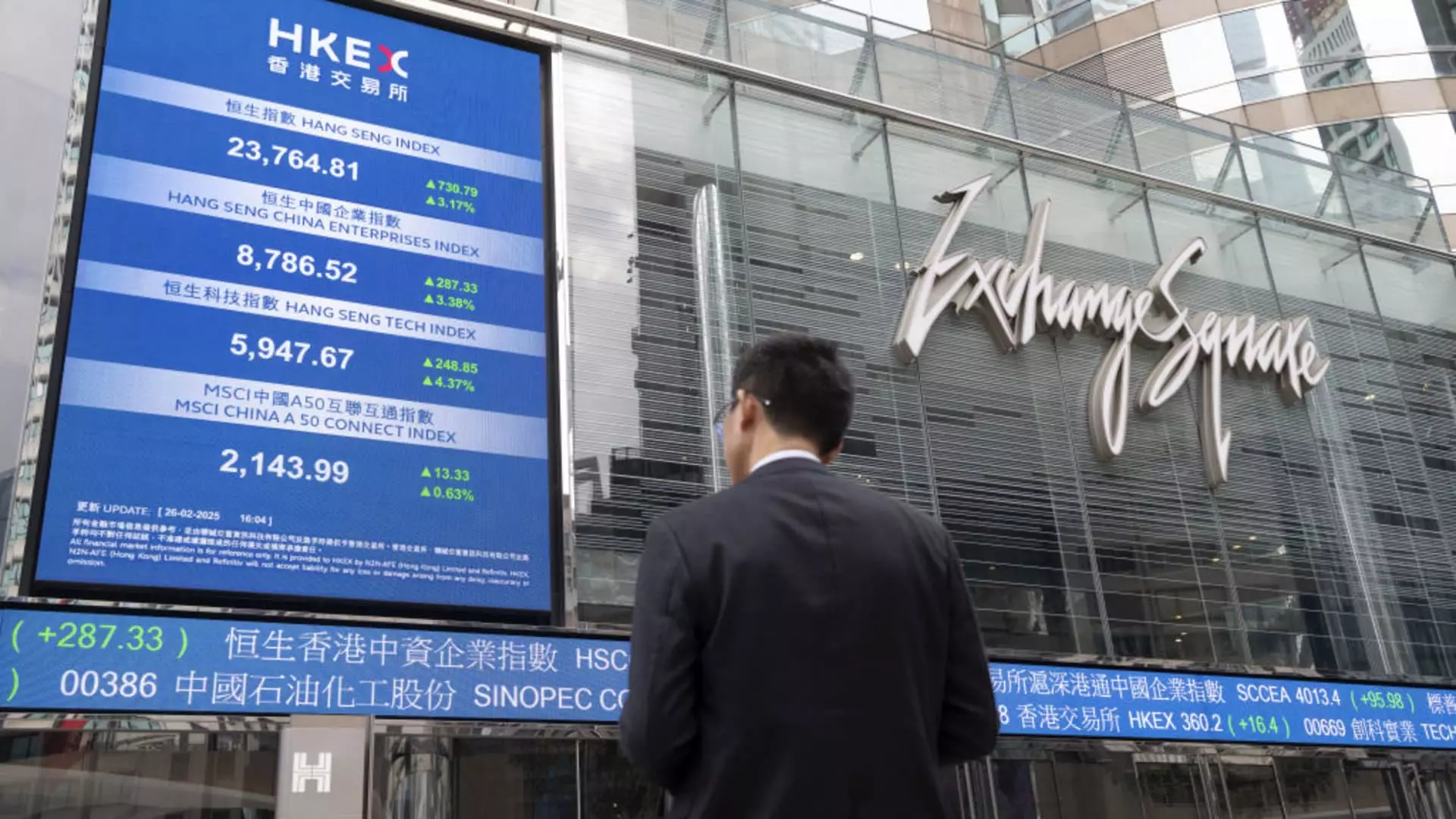The recent surge of Chinese companies flocking to list on the Hong Kong Stock Exchange is being heralded as a significant turnaround for the East Asian economic powerhouse. Following the much-publicized success of DeepSeek, a company claiming to rival OpenAI’s ChatGPT, excitement permeates the air, promising a newfound investor confidence in China. However, beneath this veneer of rejuvenation lies a complex web of risks and challenges that are often overlooked. The very optimism surrounding the IPO landscape may well be a precarious illusion, masking the harsh realities that have taken root in China’s economic soil.
A variety of factors contribute to the enthusiasm bubbling around the Hong Kong IPO market. The re-engagement of U.S. long-term funds has provided a superficial boost to investor sentiment. Yet, one must question whether this uptick genuinely represents confidence in the Chinese economy or is merely a momentary blip, sparkling briefly before plunging back into obscurity. The weight of U.S.-China trade tensions continues to cast a long shadow; an analysis of the interplay between these superpowers reveals a fraught relationship that inevitably impacts market stability.
Playing Roulette with Regulations
The collaborative spirit among IPO candidates, investors, and regulators, as praised by market watchers, may create the illusion of harmony. Yet, the very rules governing these financial transactions remain a source of unease. Recent adjustments to Hong Kong’s listing regulations intend to invite more foreign capital and support mainland companies seeking dual listings. This baiting of investors could, however, lead to a regulatory quagmire where compliance becomes a double-edged sword, jeopardizing not just finances but also the very integrity of the IPO framework.
Moreover, Chinese authorities have announced intentions to provide greater support for the private sector after years of tightening their grip. While this may sound encouraging, skepticism is king here. A mere shift in rhetoric does not erase the oppressive environment that has stifled innovation and autonomy among entrepreneurs for years. Investors may find their hopes dashed if these companies are still forced to operate under the watchful eye of an overreaching government, which ultimately prioritizes control over sustainable growth.
Illusions of Grandeur Amid Economic Woes
In the first quarter of this year, 15 IPOs managed to raise a handsome sum of 17.7 billion HKD — a remarkable figure when compared to prior years. However, those numbers are painted against an incredibly low bar set by the previous year. In 2021, the market was far more buoyant, boasting 32 IPOs and capital raising of 132.7 billion HKD. This broad disparity begs an important question: Are we witnessing genuine recovery in the IPO market or merely a desperate gasp for breath as China navigates through turbulent economic waters?
The stark truth is that while individual companies might showcase high valuations and strong first-day performances, the macroeconomic indicators in China paint a troubling picture. The emergence of an AI boom is not sufficient to mask the structural issues plaguing the economy, particularly when one considers the impact of prolonged COVID-19 policies and fluctuating global market sentiments. The unfurling tech narrative appears compelling, but one misstep — be it regulatory, market-driven, or geopolitical — could unravel this carefully constructed narrative.
Investor Caution: A Call for Vigilance
As companies like Contemporary Amperex Technology (CATL) pursue ambitious listings in Hong Kong, one must firmly grasp the importance of cautious optimism. The environment in China remains unstable, with factors that can derail the market at the drop of a hat. From potential international sanctions stemming from strained U.S.-China relations to unforeseen domestic regulatory crackdowns, investors are playing high-stakes roulette with the fate of their investments.
The ideological undertones of an assertive China under President Xi Jinping continue to resonate through tech and finance sectors. While greater cooperation between regulators and IPO aspirants might foster an optimistic mood, grassroots movements reminding us of the pitfalls associated with government engagement in private enterprise are paramount. One must remember that a legislative shift can backfire, igniting crises that can spiral out of control.
While the immediate sparkle of Hong Kong’s IPO market dazzles, it behooves investors to remain vigilant. The temperamental nature of China’s economy, intertwined with the unpredictable backdrop of U.S.-China relations, raises troubling questions that demand thoughtfulness over excitement. Investors must steel themselves against potential pitfalls that could tarnish the celebratory narrative currently unfolding, for in this world of financial opacity, the mirage of success may well give way to stark reality.

